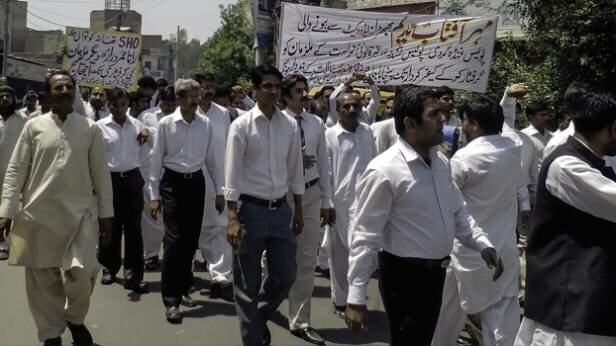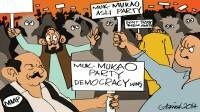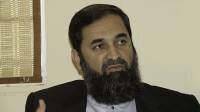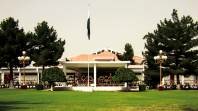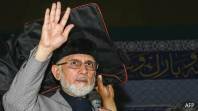After disenfranchised minorities, schoolchildren, teachers and social activists, sixty nine lawyers now find themselves the latest victims of Pakistan’s controversial blasphemy laws. The registration of an FIR charging the lawyers with blasphemy in Jhang last month become sensational news in global media outlets; human rights organizations all around the world have already expressed great dissatisfaction with the potential for misuse in these draconian statutes.
Opponents and reformists have argued that in a country with such a heavy handed and belligerent police force, and religious leaders who make their careers out of fanning the fires of sectarian hatred, such laws only invite injustice and abuse, and so it proves to be the case time and again.
On 12th May 2014, Kotwali Police lodged an FIR charging blasphemy against nine nominated and sixty unnamed members of the District Bar Association. The FIR was lodged after lawyers staged a protest demonstration for the arrest of SHO Umar Daraz who, according to the lawyers, had illegally detained and tortured one of their colleagues, Aftab Nadeem.
The lawyers contend that the aforementioned SHO had a heated exchange of words with Aftab Nadeem and that later some policemen from the Kotwali station picked up, illegally detained and brutally tortured the lawyer. At the intervention of the local bar association, and under pressure from the lawyers, the DPO ordered a registration of an FIR against SHO Umar Daraz.
Though the local police complied with the orders, the department as well as local leaders from the Ahle Sunnat Wal Jamaat (ASWJ), alleged to having ties with Umar Daraz, prevented, through disobeying the writ of law and political posturing, any further action from being taken. The SHO was not relieved of his duties, nor was he put under arrest, and continued to function as a station officer.
Having been frustrated with the lack of due process and legal follow up to their FIR, the lawyer fraternity organized a demonstration in Jhang city calling for the immediate removal and arrest of SHO Umar Daraz. During the protest, the furious lawyers chanted slogans against the police department in general, and the SHO in particular, slogans meant to question their integrity and paint them in a negative light.
That is when things took a turn for the bizarre. Wanting to put a quick stop to the ongoing protestations, the police made a retaliatory booking against the lawyers, but instead of the usual crowd breaking fare of public nuisance, civil unrest or vandalism, the Kotwali station, on an appeal from sympathetic ASWJ members, filed a blasphemy charge against the entire gathering of protestors.
The complainant was one Arshad Mehmood of the ASWJ. He claimed that the protesters were chanting slogans against the name of Hazrat Umar bin Khattab, the second caliph of Islam, and had hence committed blasphemy. He also said that the words of the lawyers had offended his religious sensibilities and had been an attempt to create sectarian strife in the city between the Shia and Sunni communities, a claim even more bizarre than his original allegations, since it is the ASWJ and its closely affiliated precursors that have been the cause of much sectarian tensions in Jhang.
In collusion with the applicant, Kotwali police then filled out the controversial charge sheet, citing sections 294/14 and 298/A of the PPC. Interestingly, the accusation of inciting sectarian hatred by abusing a namesake of Hazrat Umar, mostly includes the names of Sunni lawyers, who expressed their disbelief at the thought of having dishonoured their most venerated caliphs name.
The controversial section 298/A reads that, “whoever by words, either spoken or written, or by visible representation, or by any imputation, innuendo or insinuation, directly or indirectly, defiles the sacred name of any wife (Ummul Mumineen), or members of the family (Ahl-e-Bait), of the Holy Prophet (Peace Be Upon Him), or any of the righteous Caliphs (Khulafa-e-Rashideen) or companions (Sahaba) of the Holy Prophet (Peace Be Upon Him) shall be punished with imprisonment of either description for a term which may extend to three years, or with fine, or with both.”
The problems with the wording above are manifold. The clauses ‘indirectly’, ‘insinuation’ and ‘imputation’ are completely vague and legally ill-defined terms. What constitutes an indirect attack on a holy and historical personage? What constitutes an insinuation of blasphemy? What are the rational limits of an imputation?
It is exactly this vague legal language that opponents of the blasphemy clauses in the PPC have been arguing against.
Vagaries in the law throw it open to potential abuse. An SHO for personal motives has misused this term of ‘indirect’ to consider any denigrating remark, against any present day person who happens to share a name with a holy figure, as blasphemy. This notion is rationally, ethically and legally absurd.
Anybody named after holy personages can start walking around with complete social and legal impunity, because to associate their names with criminal activities or social evils would constitute indirect blasphemy.
Moreover, these absurd laws make a mockery of religion. Reducing historical religious personalities to mere names to be thrown around during charge sheets and conspiracies is ethically dubious and religiously offensive.
Even the law doesn’t uphold the ‘coincidence’ that the ASWJ complainant had an FIR filed in Umar Daraz’s station mere days after the SHO had an FIR drafted against himself by the accused. The law gives judges legal authority to dismiss retaliatory and spurious charge sheets.
Muhammad Afzal Sial, President Jhang Bar association said that the lawyers community had moved an application in the court of Additional Sessions Judge for the arrest of the SHO. “The blasphemy case that was framed against us is totally baseless and ridiculous and is meant to pressurize the lawyers’ community to withdraw the FIR against the SHO,” he added.
Zia Kazmi, an advocate who is also nominated in the blasphemy case alleges that the local administration as well as ASWJ leaders were desperate to save the skin of the SHO. “In a meeting with a delegation of lawyers, Ahmed Ludhianvi termed Umar Daraz as his son and asked the lawyers to withdraw FIR against him. In exchange he assured the lawyers that the blasphemy case lodged against them will be withdrawn,” Kazmi said.
Zia Kazmi who is also former secretary general of Jhang Bar Association said that Ahmed Ludhianvi, a religious figure notorious for having ties with banned militant organization Lashkar-e-Jhangvi, had been pressuring local administration to negotiate a peace between the lawyers and Umar Daraz.
He said Muavia Azam, son of late Maulana Azam Tariq of SSP, was delivering hate speeches against Shia community in the town but nobody had registered a single FIR against him. He claimed that sessions judge was also convinced that the blasphemy FIR was a fake one and meant to save the accused SHO. “In our presence he contacted the DCO and DPO and told them not to create a sectarian situation to save a policeman,” Kazmi claimed.
But saving a morally corrupt policeman is what this case seems to be all about. Follow ups in this controversy are completely absent from local press and media. The protectors of hatred spewing militants have ensured that this does not become a national issue. Nobody is reporting, for instance, that in the FIR against SHO Umar Daraz, two ASIs and three constables were also nominated, the two ASIs have had their names removed from the charge sheet since, and the SHO will no doubt achieve a similar quiet escape.
The Sessions Judge on 23rd May upheld the lawyer’s allegations against the three constables, but not against the inspectors. An out of court settlement that will likewise be hushed up in local media is undoubtedly on the cards. Because clamouring against blasphemy laws attracts dangerous attention, as governors and ministers have found out to their detriment, nobody is eager to take up the cause.
The silence of the press however, is only making matters worse. Blasphemy accusations have spiked in Pakistan recently, a 2012 study by the Islamabad-based think tank, the Center for Research and Security Studies, showed 80 complaints in 2011, up from a single case in 2001.
Analysts say blasphemy allegations are increasingly used to settle feuds or grab property. Unbelievably, there is no still penalty for false accusations.
Kamran Murtaza, President Supreme Court Bar Association expressed sorrow over the manner the blasphemy laws were being misused in the country. “In most of the blasphemy cases it is an ethically questionable exercise meant to settle grudges and scores. In this case police is doing injustice and we are standing with the lawyers,” he added.
Prominent human rights activist, Hina Jilani said that blasphemy law had become a tool for political vendettas and social revenge. “Now it looks that it has been designed to create division in society. Even those lawyers who dare to plead the cases of the accused are killed, an incident like that happened in Multan recently. The presiding judges too are threatened,” she said, adding that those forces which had badly failed to come to power through votes and parliamentary means were using religious angles the power.
“Democracy and vote have rejected such religious bigots again and again,” she added. Democracy might have rejected religious strife but when will the law catch up with the mandate of the people, the penal code must be reformed to stop using religion as a tool, and making a mockery of its hallowed past.

